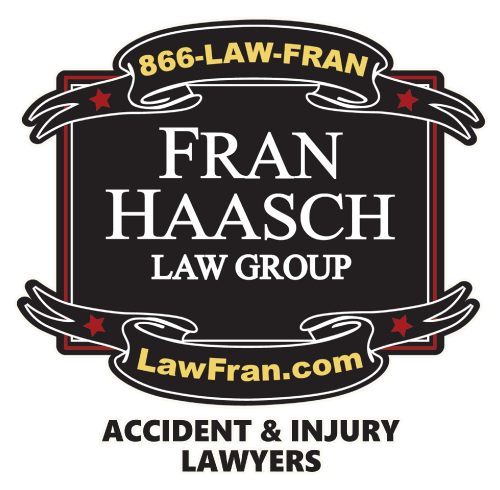The Most Common Car Accident Injuries
Car accident injuries can range from minor scratches and bruises to more severe, life-altering conditions. The force of a collision often subjects the body to rapid deceleration, causing various types of injuries. From more minor injuries like soft tissue injuries, sprains, or whiplash to severe injuries including paralysis, you must seek medical attention after being involved in a car accident.
If you are suffering from one of these car accident injuries, it is crucial to ensure you have the right legal representation to support your claim. Contact the Fran Haasch Law Group Accident & Injury Lawyers for expert assistance. Our team has extensive experience in handling a wide range of car accident cases and is committed to helping you receive the compensation you deserve. We understand the physical, emotional, and financial toll these car accident injuries can have on your life, and we are here to guide you through every step of the legal process.
Soft Tissue Injuries from Car Accidents
Soft tissue injuries are among the most common yet often overlooked consequences of car accidents. These car accident injuries involve damage to the body’s tissues except for bones, including muscles, tendons, and ligaments. Contusions (bruises), sprains, and strains fall under this category, stemming from blunt force trauma during a collision. A contusion occurs when capillaries and blood vessels are damaged, leading to bruising. Sprains involve the overstretching or tearing of ligaments, while strains affect muscles and tendons similarly. Although they may seem minor compared to more severe injuries, without proper diagnosis and treatment, soft tissue injuries can lead to chronic pain and discomfort, significantly affecting a person’s quality of life. Early intervention and appropriate medical treatment are critical for a full recovery.
Neck Injuries
Neck injuries are a particularly common outcome of car accidents, chiefly due to the sudden force exerted during collisions that causes the head to jerk unpredictably. This section typically suffers from a range of conditions, from minor strains and sprains to more grave injuries like cervical dislocation or disc injury.

Whiplash Injury
Whiplash is perhaps the most well-known form of neck injury resulting from car accidents, fitting into the categories of both neck sprains and strains. It is also classified as a soft tissue injury. Whiplash injuries occur when the head is suddenly jolted forward, backward, or to the side, stretching the neck muscles and ligaments beyond their usual range of motion. Symptoms can include pain and stiffness in the neck, headaches, dizziness, and sometimes blurred vision or memory problems. Diagnosis is typically through physical examination and imaging tests such as X-rays, CT scans, or MRIs to rule out more serious damage. Treatment for whiplash may involve pain management, physiotherapy, and exercises to strengthen neck muscles, with most individuals recovering within a few weeks to months. Nonetheless, some may experience chronic neck pain or other long-lasting complications, highlighting the importance of seeking prompt medical attention after an accident.
Cervical Dislocation
Cervical dislocation occurs when there is an abnormal separation in the vertebrae, often leading to immediate and severe pain, and potentially resulting in long-term mobility issues without prompt and proper treatment.
Disc Injuries
Disc injuries, on the other hand, can include herniated discs, where the cushioning between the spinal vertebrae is pushed outside its normal boundary, causing not only pain but also numbness and weakness along the arms or legs, depending on where the injury is located along the spine. Early diagnosis and treatment for neck injuries are critical to managing pain and preventing further complications, showcasing the importance of seeking medical attention after any car accident, even if symptoms do not appear immediately.
Chest Injuries
Chest injuries in car accidents are a significant cause of concern due to the vital organs located in this part of the body, such as the heart and lungs. These injuries often result from the forceful impact against the steering wheel, dashboard, or seat belt.

Rib Fractures
Broken ribs are the most common chest injury, which can lead to severe pain and complications like punctured lungs or damage to other internal organs.
Pneumothorax
Pneumothorax, also known as a collapsed lung, occurs when air leaks into the space between the lung and chest wall, making it difficult to breathe and potentially life-threatening.
Cardiac Contusion
Cardiac contusion, a bruise of the heart muscle, can result from a direct blow to the chest and may affect the heart’s functioning.
Internal Bleeding
Blunt trauma to the chest can also result in internal bleeding or damage to the aorta, the body’s main artery, which requires immediate medical intervention. Like other injuries discussed, the swift recognition and treatment of chest injuries are crucial to prevent more severe health outcomes.
Head Injuries
Head injuries are a critical concern in car accidents, encompassing a wide range of conditions from minor concussions to severe traumatic brain injuries (TBIs). The force of impact in a collision can cause the head to move abruptly or strike objects within the car, leading to different head injuries.

Concussion
Concussions, the most common type of head injury, occur when the brain is jolted within the skull, affecting brain function temporarily. Symptoms can include headaches, confusion, dizziness, and memory loss.
Skull Fracture
More severe head injuries, such as skull fractures or brain contusions, involve physical damage to the brain or skull and can have lasting impacts on an individual’s cognitive, physical, and emotional abilities.
Traumatic Brain Injury
Traumatic brain injuries might not only result in immediate health issues but also in long-term complications, such as changes in personality, impaired cognitive functions, and physical disabilities. Immediate medical evaluation and treatment are critical to assess the extent of the injury and to implement a proper recovery plan.
Back Injuries
Back injuries in car accidents are a prevalent outcome due to the sudden impact and twisting forces exerted on the body. These injuries can range from mild strains and sprains to more severe conditions such as vertebral fractures or spinal injuries.
Lumbar Sprains
Lumbar sprains occur when the ligaments in the lower back are stretched or torn due to sudden force. This can result in significant pain and limitation in movement.
Spinal Fractures
Spinal fractures involve a break in one or more of the vertebrae in the spine, which can lead to severe pain and, in serious cases, lead to spinal cord damage.
Herniated Discs
Another resulting injury is a herniated disc, where the cushioning between the vertebrae protrudes, pressuring nearby nerves. This can cause pain, numbness, or weakness in the limbs.
Spinal Cord Damage
Spinal cord injuries from car accidents are among the more serious injuries from a motor vehicle accident, with the potential for lasting, life-altering impacts. The spinal cord does not have to be severed to cause a loss of functioning; even a bruise or partial tear can result in significant disability. Spinal cord injuries can range from temporary paralysis to complete, permanent paralysis below the level of the injury. Symptoms can include loss of movement, sensation, or function, difficulty breathing, and incontinence. The location and severity of the injury determine the extent of the impairment.
Treatment for back injuries can vary from medication and physical therapy to, in severe cases, surgical intervention. Like other car accident-related injuries, the early diagnosis and treatment of back injuries are crucial to prevent long-term disability and to facilitate recovery.
Arm and Leg Injuries
Arm and leg injuries in car accidents can range from minor bruises and lacerations to more severe fractures and dislocations. Fractures, the most prevalent arm and leg injuries, can vary in severity from simple breaks that may heal with minimal treatment to complex fractures that require surgical intervention. The force of the crash can cause limbs to strike the vehicle’s interior or be crushed by the impact, leading to compound fractures where the bone pierces through the skin, or comminuted fractures involving the bone breaking into several pieces. Dislocations are also common, where the force of the accident causes joints to move out of their normal alignment. This can significantly impact mobility and may require surgical repair to correct. Soft tissue injuries, including tendon and ligament damage, can also occur, leading to pain, swelling, and a long recovery process. Rehabilitation plays a pivotal role in recovering from arm and leg injuries, with physical therapy often necessary to restore strength and mobility. Early assessment and treatment are crucial for healing and minimizing the long-term effects of these injuries.
Knee Injuries
Knee injuries are another common consequence of car accidents, primarily due to the sudden and forceful impact that can cause the knee to hit the dashboard or door. These injuries can range from minor bruises to severe damage to the ligaments, cartilage, or the structure of the knee itself.

Anterior Cruciate Ligament Injury
Anterior Cruciate Ligament (ACL) injuries are among the most serious injuries, potentially requiring surgery and lengthy rehabilitation to regain full function of the knee joint.
Meniscus Tear
Meniscus tears, caused by the twisting or turning of the knee while bearing the weight of the body, can lead to significant pain and mobility issues.
Patellar Fracture
Patellar fractures, where the kneecap itself is broken, can immobilize the knee and require surgical intervention to properly heal. Knee injuries not only cause immediate pain and suffering but often result in long-term complications such as arthritis and decreased joint mobility, emphasizing the importance of prompt medical evaluation and treatment following an accident.
Internal Injuries
Internal injuries in car accidents are particularly insidious because they can be hard to detect immediately after the collision. These injuries can involve damage to internal organs, internal bleeding, or ruptures that may not present clear symptoms until hours or days following the incident. The force of impact or penetration injuries from shattered glass or metal can cause spleen lacerations, liver injuries, or kidney damage, all of which might require urgent surgical intervention. Internal bleeding is another critical concern; it can occur in the abdomen, chest, or pelvis, leading to life-threatening conditions if not promptly addressed. Symptoms of internal injuries can be varied, including pain, swelling, dizziness, and fainting, making it essential for car accident victims to seek immediate medical examination even if they feel fine initially. The early detection and treatment of internal injuries are crucial to prevent complications and ensure the best possible outcome for recovery.
Facial Injuries
Facial injury is another common car accident injury, due to the proximity of the driver and passengers to steering wheels, dashboards, airbags, and windows. These injuries can range from minor abrasions and lacerations to more severe traumas such as fractures, dental injuries, and deep cuts. Fractures can affect any part of the facial skeleton, including the nose, cheekbones, jaw, and orbital sockets, often requiring surgical intervention to restore appearance and function. Lacerations may result in significant scarring and necessitate plastic or reconstructive surgery. Injuries to the eyes can be particularly concerning, with the potential for vision loss or impairment. Dental injuries, including broken, dislodged, or lost teeth, can affect a person’s ability to eat and speak and may require long-term dental care. The emotional impact of facial injuries should not be underestimated; they can result in significant psychological distress due to changes in appearance and self-esteem. Prompt medical assessment and treatment are essential to mitigate these effects and facilitate recovery.
Penetrating Injuries
Penetrating injuries in car accidents represent a critical and often life-threatening category of trauma, typically resulting from sharp objects breaking the skin and entering the body. These injuries can be caused by shattered glass, metal debris, or any other projectiles propelled with force during a collision. The degree of harm from a penetrating injury depends on the object’s size, speed, and trajectory, as well as the body part affected. Vital organs or blood vessels can be damaged, leading to immediate and severe complications. Treatment for penetrating injuries requires swift, professional medical intervention to minimize blood loss, prevent infection, and repair the damage. Surgical procedures may be necessary to remove foreign objects, repair tissue damage, and ensure no internal injuries have been overlooked. The importance of thorough and immediate medical evaluations following any accident cannot be overstressed, as the external wound may belie the extent of internal harm.
Tinnitus
Tinnitus, often described as a ringing, buzzing, or hissing in the ears, can be an unexpected aftermath of a car accident. This condition results from damage to the auditory system, often due to the intense noise of the crash itself or head injuries sustained during the incident. Victims may experience tinnitus in one or both ears, with symptoms ranging from mild, intermittent sounds to a constant noise that can significantly impact daily life and mental health. While there’s no cure for tinnitus, treatment options such as sound therapy, hearing aids, and cognitive-behavioral therapy can help manage symptoms and improve quality of life. It’s crucial for individuals experiencing tinnitus following a car accident to seek medical advice for a thorough assessment and to explore potential treatments to alleviate the condition.
Nerve Damage
Nerve damage is another critical, though less visible, injury that can occur as a result of car accidents. The violent forces involved in crashes can stretch, compress, or even sever the nerves, leading to a range of neurological symptoms. Peripheral neuropathy, affecting the nerves outside the brain and spinal cord, can manifest as numbness, tingling, pain, or weakness in the affected areas, often the arms or legs. In more severe cases, victims might experience neuropraxia, where the nerve is temporarily blocked, or axonotmesis, involving the disruption of the nerve fibers, which may heal over time with proper medical treatment. At the extreme end, neurotmesis represents the most severe form of nerve injury, where the nerve is completely severed, potentially leading to permanent loss of function and sensation in the affected body part. Recovery from nerve damage can be slow and requires a multidisciplinary approach, including pain management, physical therapy, and sometimes surgical intervention, highlighting the importance of early and comprehensive medical assessment following an accident.
Psychological Injuries
Psychological injuries are another significant yet often overlooked consequence of car accidents. These can include a wide range of emotional and cognitive issues such as post-traumatic stress disorder (PTSD), anxiety, depression, and phobias, particularly a fear of driving or being in a car. The trauma of the event can lead to long-lasting psychological scars, impacting an individual’s daily functioning and quality of life. Symptoms may manifest as nightmares, flashbacks, persistent fear, mood swings, and avoidance of certain activities or locations associated with the accident. Unlike physical injuries, psychological wounds can be less apparent to others, making them more challenging to diagnose and treat. It is crucial for accident victims to receive comprehensive care that addresses not only the physical but also the emotional aftermath of an accident. Early intervention and support, including therapy and counseling, can be vital in helping individuals recover and regain a sense of normalcy.

The Fran Haasch Law Group Accident & Injury Lawyers are Committed to Car Accident Victims
The Fran Haasch Law Group Accident & Injury Lawyers are well aware of the devastating impact motor vehicle accidents can have on individuals and their families. With a deep understanding of the common injuries sustained in such motor vehicle accidents, our team is here to offer expert legal assistance and compassionate support. Whether you are dealing with fractures, nerve damage, psychological injuries, or any other harm resulting from a car collision, our experienced attorneys are prepared to fight for the compensation you deserve. We are committed to helping victims recover not just financially, but also emotionally and physically, guiding you through each step of the legal process with dedication and empathy. If you or a loved one are suffering from car accident injuries, do not hesitate to reach out to The Fran Haasch Law Group Accident & Injury Lawyers for a free consultation.












